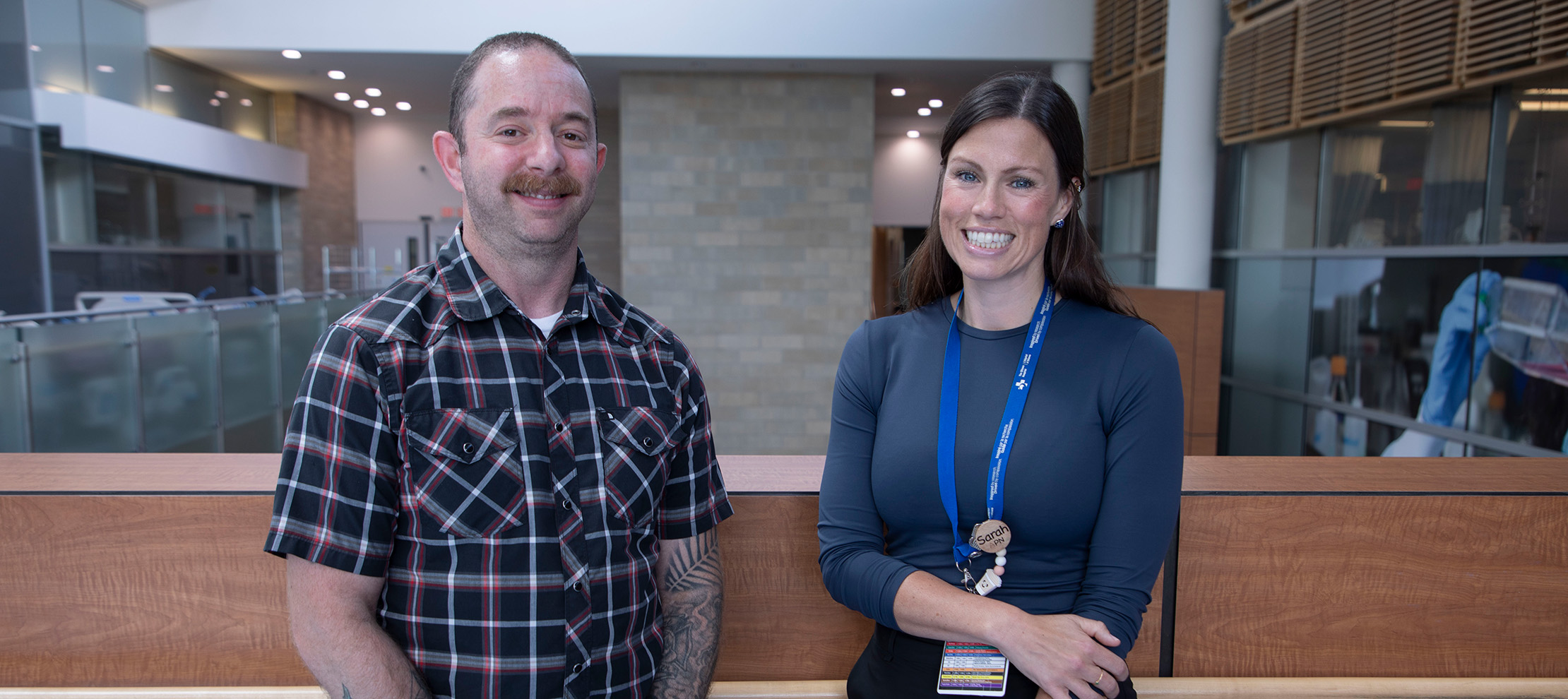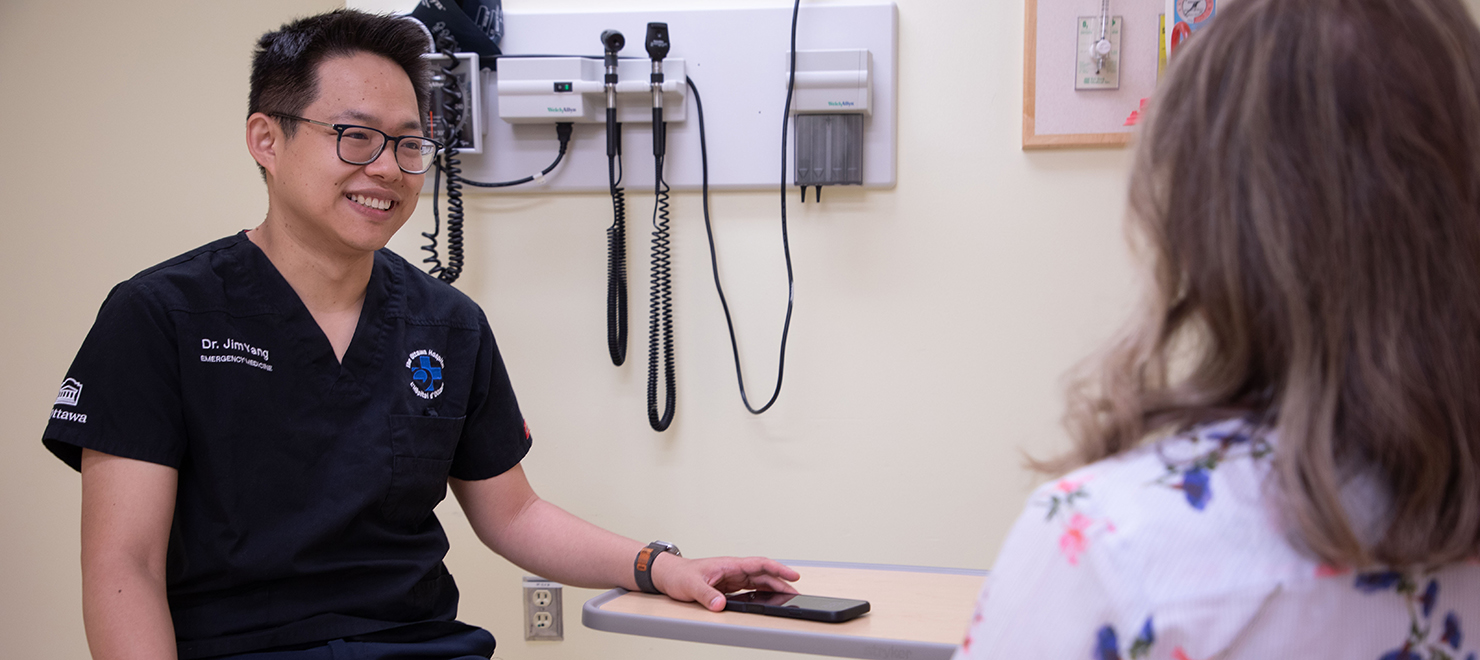
Dr. Ian Stiell is known around the world for creating decision rules that improve patient care, such as the Ottawa Ankle Rules, the Canadian C-Spine Rule, and now The Ottawa COPD Risk Scale.
Patients with chronic obstructive pulmonary disease (COPD) often come to the Emergency Department gasping for breath. These flare-ups can usually be treated safely in the ED, but sometimes they can lead to serious complications.
That’s why Dr. Ian Stiell created a decision tool to help doctors accurately predict which patients were the most likely to suffer complications.
A recent study published in CMAJ found that The Ottawa COPD Risk Scale is better than current practice at predicting these short-term risks. Now, this made-in-Ottawa tool can be used by doctors around the world to help choose the best care for their patients with COPD.
“Before this tool, there was no way to know if a patient who came to the Emergency Department with a COPD flare-up was going to have serious complications,” said Dr. Stiell, also a senior scientist at The Ottawa Hospital and distinguished professor at the University of Ottawa. “This new information can help doctors decide whether to admit a patient or send them home.”
COPD is a group of diseases that block airways and affects 11 percent of Canadians over age 35. Flare-ups of the disease make it harder to breathe and can lead to complications like needing a breathing machine or having a heart attack or death. However, identifying which patients will experience these complications is challenging. Dr. Stiell’s team previously found that about half of patients with COPD who suffer adverse events in Canada do so after being sent home. Until now, there has been little evidence to help prevent this.
“This tool will improve care for patients with COPD by helping ensure that those at high risk of dangerous complications are admitted to the hospital, and those at low risk are sent home,” said Dr. Stiell.
Dr. Stiell noted that doctors consider many factors when deciding whether to admit a patient, including how much support they have at home and whether they can see a doctor within a week of their visit. The Ottawa COPD Risk Scale does not replace these considerations but provides additional information to help doctors make a decision.
Dr. Stiell’s research team developed a tool based on data from 945 patients from Canadian hospitals. The 10-point scale includes elements from a patient’s history, examination or tests conducted during their visit. These risk factors are easy to determine and do not need expensive further testing.
A validation study with 1,415 more patients showed that using the risk scale is better than current practice. If used, it will likely increase COPD admissions for higher-risk patients while decreasing admissions of low-risk patients. Researchers don’t expect this tool to cause a net increase in COPD admissions overall.
“There’s no question that this tool can be used today,” said Dr. Stiell. “While designed for emergency physicians, it could also help others who serve patients with COPD, including respirologists, general internists and family doctors.”
Dr. Stiell is known around the world for creating decision rules that improve patient care, such as the Ottawa Ankle Rules and the Canadian C-Spine Rule. These rules are now available on a mobile app.
This study was funded by the Canadian Institutes of Health Research. Research like this is possible because of generous support for research to improve patient care at The Ottawa Hospital.

Support patient care and research at
The Ottawa Hospital
You might also like…
Reimagining hospital food: How The Ottawa Hospital is transforming the patient mealtime experience
In 2024, we launched the trial phase of our Patient Food Transformation Project. The goal was to see if it is possible to improve the overall nutrition and quality of food we serve to our patients, while increasing bedside hospitality, enhancing the overall sustainability of our food services, and not increasing operational costs. Our trial wrapped in 2025 with very promising results.
How we’re helping over 1,400 paramedics enhance patient care and safety
The Regional Paramedic Program for Eastern Ontario (RPPEO) is on a mission to enhance what happens after you dial 911. Here are three new ways this team is helping paramedics deliver better, safer care to their patients.
New program fills gap in care for teens and young adults with cancer
For young people, a cancer diagnosis can disrupt their education, careers, relationships and family-building goals. Our Adolescent and Young Adult (AYA) Cancer Program supports AYAs on their cancer journey, complementing the care provided by their care team.
Less time charting means more time with patients: How The Ottawa Hospital is using AI to support patient care
“I’m seeing and treating more patients.” Find out how DAX Copilot, a powerful AI assistant, is helping our physicians cut down on paperwork, improve their own well-being and spend more time with patients.
New reusable surgical gowns a step towards greener operating rooms
The Ottawa Hospital is finding safe, innovative ways to reduce medical waste in its operating rooms by using more environmentally sustainable products.
“Crash testers”: Preparing our health-care teams for real-life emergencies
Swapping patients for manikins, our Simulation Patient Safety Program recreates medical emergencies right in our hospital, allowing our care teams to “crash test” their responses to cardiac arrests, respiratory failures, mass casualty events and more. Dive into this Q&A for a closer look at how this training program enhances patient safety and quality of care.


 To reset, hold the Ctrl key, then press 0.
To reset, hold the Ctrl key, then press 0.





